First School of Humanities and Social Sciences Student Expo
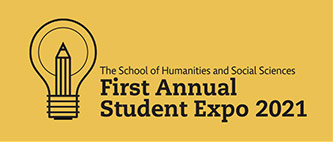
HSS Student Expo
The idea of showcasing the research and accomplishment of students in the many departments and programs housed within the School of Humanities and Social Sciences was conceived by Dean Gould for the Spring 2020 and then postponed in the wake of the COVID lockdown and the scramble to go to a remote learning environment. This spring, after three semesters of remote learning and a new normal for the College, the first HSS Student Expo was indeed held- virtually. Though not in convened as in person meetings, the first HSS Student Expo was a great success. Eight departments and degree granting programs as well as other entities within HSS participated to take advantage of the opportunity to present the results of our students’ stellar work and scholarship. Over 300 students, faculty and staff attended the thirteen different events held over the course of the two days. The students’ presentations were exceptional and their hard work evident. A few examples from the two-day series of events make it clear that the Expo showcased HSS students’ high level intellectual output while trying out new ways to display the scholarly rigor of our students and faculty.
Communication Arts, Sciences and Disorders (CASD)
The Department of Communication Arts, Sciences and Disorders (CASD) presented five undergraduate and graduate students’ research, covering topics such as multicultural counseling in Speech-Language Pathology, online learning in minority populations, and knowledge and awareness of hearing loss by education majors. Three of the five students are undergrad CASD majors in the BC Honors Academy. They each presented their senior honors project, work which was also presented at the National Conference on Undergraduate Research (NCUR) in early April. One CASD major presented on the three-dimensional laryngeal model that she designed for her anatomy course. The last student presenter was a CUNY Audiology doctoral (AuD) student, Samantha Presbrey, who had served as a guest lecturer for three sections of a CASD course for Education majors this past semester, “Survey of Speech, Language and Hearing Disorders” (SLP). For her doctoral project, Samantha used a data collection technique to assess the students’ knowledge of the implications of undiagnosed hearing loss in children. Samantha’s report on the feedback from the CASD students & SOE students regarding this collaboration was so positive that Professor di Toro revealed that they will work to facilitate such a collaboration in future semesters.
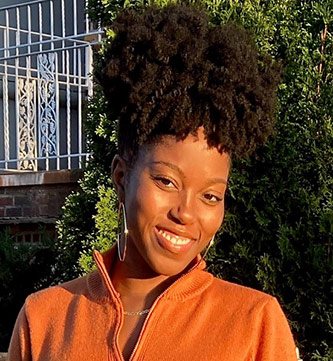
Leah Etienne, President, The ChildrenFirst Club E-board
Student Clubs
Two sessions were organized by student clubs. The Children and Youth Studies (CHST) ChildrenFirst Club presented a panel entitled, Hear Our Voices: Children & Youth Students Speak Their Truth. Very much grounded in the human rights paradigm on which the program was founded, the students continued this vision by creating an online library focused on anti-racist, socially inclusive, and social justice learning. Student organizers of the panel included the ChildrenFirst Club E-board Leah Ettienne, President; Kayla Chaparro, Vice President; Ingrid Gonzalez, Treasurer; and Jacqueline Lucero, Secretary. Graduating senior Leah Ettienne described the enhancements she recently made to the Children and Youth Studies Program's Dropbox library. In recent months, Leah has transformed this aggregated CHST library, which everyone in the Program to uses, to frame social and racial justice as its the cornerstones. The club’s e-board members presented key articles and readings from this library that focus on issues of implicit bias, institutional racism, social justice, disability, and LGBTQ, current topics affecting children and youth that are relevant to them. They also played a game of Kahoots following the presentations, a fun pop-quiz that lead to a very interactive and informative session.
The other session organized by students was the Brooklyn College Historical Society CLIO Authors’ Panel. Students of the history club invited the BC community to hear the club members discuss their papers. The club produces the Department of History student authored journal Clio, where their papers will be published. This panel discussion was designed to expose students to the work of their peers on a wide range of pertinent historical topics. Participating students included Robert Adler, who hosted the session and history majors, Thomas Heinrich, and Alexander Raff.
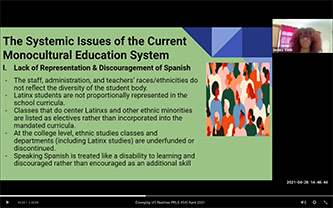
Screenshot of Nicole Trinidad’s presentation
Puerto Rican and Latino Studies (PRLS)
The Emerging U.S. Realities panel grew out of a PRLS 4510 seminar course, “Emerging Realities and Alternatives for Puerto Ricans and Other Latin@s in the US.” The students presented their formal projects/papers that were due that same day. The emerging realities that students presented ranged from women’s educational choices to Dominican racial identity. Puerto Rican and Latino Studies Professor María Pérez y González wrote that one professor’s question at the end of their presentations, “gave them (students) a sense of dignity in doing research as students. They could see that their student projects can become more important, and not just in theory, and that it could lead to graduate school and to more public speaking. They shared that they really felt good about the experience…” And to another faculty member she wrote, “Your interaction with them helped them to see that their student projects can become more important in practice and not just in theory. They shared that they really felt good about the experience, despite the nervousness.” Also in attendance for a brief time was BC alumna, Lisette Nieves (now President of the Fund for the City of New York) and faculty member at New York University.
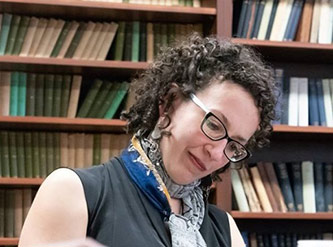
Professor Lauren Mancia, Department of History
Department of History
The Department of History sponsored three different sessions at this year’s expo. All three sessions were well attended, and each offered something exceptional to the campus community and pointed the way to even greater heights of student achievement.
The session Op-Ed Presentations involved all thirty-five students in Prof. Lauren Mancia’s class, HIST 3002 “Women, Gender, and Sexuality in Europe Before 1800.” In this session, her students presented papers arguing why studying pre-modern gender and sexuality matters in 2021. The students’ assignment was to write an opinion piece, backed up with documentation, in which they were to reflect on some aspect of contemporary culture and think about how the Middle Ages or Early Modern period can help understand how we got here, where we need to go or how far we have come.
The students had met in opinion affinity groups and streamlined their presentations in advance of the event. At the session, each group presented one after the other, thus creating a picture of the range of opinions and interpretations one could have of the same material. Professor Mancia explained that in many ways, the session followed the same format as the zoom class this semester wherein those who did not present a paper served as "commentators" in the chat, where they drew connections between what students were saying and other things they had read, defined terms for the audience or engaged in parallel conversations.
Professor Mancia made clear that the event was an opportunity to show the audience that history students not only explore the past, but actively connect it to the present, indeed engaging with how it can motivate activism in the present. As she noted, “Students allowed their study of pre and early modern history to give voice to issues they care about today, like misogyny or homophobia, etc., by showing the historical roots of these ideas or by using history to prove that these phenomena were not always present, but rather developed over time, in western society.”
The B.A. and M.A, Thesis / Mellon Transfer Research Project session featured seven B.A. students and four M.A. students. Of the seven B.A. students, two presented their senior theses and three presented their Mellon Transfer Student Research Program projects. Though this session featured a wide range of papers, the questions posed in the Q&A highlighted parallel methodologies or overlapping problems with sources. History does not usually have forums for students to present their M.A. or B.A. theses, but history faculty asserted that given the success of the Expo panel, they would plan do so going forward. They were particularly pleased that through the session, students got feedback from professors of all kinds, and “connections were made across the department between students and professors who had never met each other, which was rewarding for the students and the professors, and has encouraged meetings and new collaborations between students and faculty.” Indeed, because of their assessment of both the successes and the weaknesses revealed through the session, department chairperson Professor Phil Napoli noted that the department was inspired to script a one-credit course for the coming winter session focusing on how to present conference papers. He explained that faculty will promptly develop this course over the summer because they recognized that B.C. students' entire academic skill set will be strengthened by working on their presentation skills.
2021 Brooklyn College History Department Awards & Honors Ceremony
History Department Honors and Awards Ceremony. The Department of History sponsors an annual awards ceremony for their many scholarship and prize winners, however this year, through the Expo’s virtual platform, many more people were able to attend. Indeed, the audience was much wider than the usual audience of the awardees and their families. Professor K.C. Johnson presided over a session which featured History faculty introducing the awardees with summaries of their work and contributions, in effect, why they won their awards. To quote Department chairperson Philip Napoli, “It was wonderful to show off our great students and the great work they do, and to have them be celebrated in front of an HSS-wide audience.”
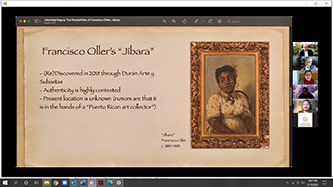
Screen shot from Daniel Vázquez Sanabria’s presentation
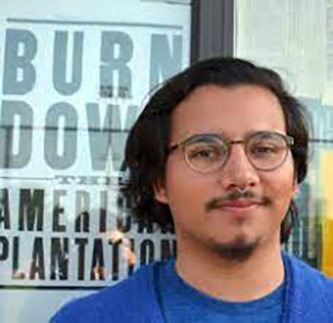
MMUF Fellow, Daniel Vázquez Sanabria
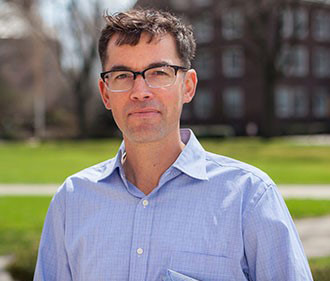
Professor James Davis, Department of English Graduate Deputy
Mellon Mays Honors Program Fellows
Since 1992, the Brooklyn College Mellon Mays Undergraduate Fellowship program has supported high academic achievers from underrepresented groups who intend to pursue Ph.D.s in the humanities and social sciences. Three of the 20–21 Mellon-Mays Fellows presented the results of their individual research projects at the Expo. Alexus Knight presented her visual sociology project, Photographing Us: The Site of the Family in Social Documentary Photography, which compares and analyzes the work of photographers Gordon Parks and LaToya Ruby Frazier in documenting black family life in two different time periods. Daniel J. Vázquez Sanabria presented Jibaridad Negra: The Possibilities of Francisco Oller’s “Jibara,” which compared and analyzed the racial and cultural implications of contrasting depictions of the iconic Puerto Rican peasant and what it means for the evolution of Puerto Rican identity.
Sarah Gafur presented, Y(our) Menopause: Menopause in Advertisements and Women’s Own Articulations of Their Menopause Journeys, an analysis of media representations of menopause and their impact on women’s self-identity and self-image.
English Department Master‘s Thesis Presentations
The English Department presented eight Master of Arts (M.A.) candidates who prepared their theses during the 2020–21 academic year. Students read from their work and engaged participants in Q&A.
Department of English Graduate Deputy Professor James Davis explained that the student organization, the Graduate English Committee, normally runs an annual Spring conference to which other graduate students from the tri-state area are invited. But rather than try to mount such a conference remotely, the graduate program committee agreed to present their M.A. theses for the EXPO. The session was structured such that the student’s advisor introduced the student and their project. Professor Davis explained that since students now submit their theses online, the actual completion of this important milestone can feel “anti-climactic.” Currently, completion does not require a meeting with a committee, the student’s advisor or other students in the cohort. Candidates now merely hit “submit” to send in the results of their months of hard work. Professor Davis said he realized that an event such as this Expo session, saves M.A. thesis completion from being another administrative transaction, especially since there is not even a physical thesis anymore. As he said, “So, holding an event like this is a way to collectively mark the occasion, to celebrate the achievement of a milestone, and to learn from one another.”
This year’s first annual HSS Expo provided HSS students an exciting forum to present and share the fruits of their academic labors. The energy and indeed synergy that grew out of these thirteen sessions reminds all of us how and why the intellectual achievements of our students invigorate the entire campus community and animate our work.






